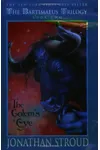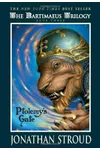Step into the spellbinding world of the Bartimaeus Sequence, where a sassy 5,000-year-old djinni and a teenage magician navigate a magical London brimming with intrigue and rebellion! Written by Jonathan Stroud, this young adult fantasy series blends alternate history, sharp humor, and moral complexity, offering a thrilling ride through a world where magic shapes empires and loyalty is never certain.
Unlike typical fantasy tropes, Bartimaeus delivers a fresh take with its witty narrative and morally gray characters. From the gritty streets of a magician-ruled London to the chaotic Other Place, the series captivates readers with its unique blend of political drama and supernatural flair. Ready to explore this magical saga? Let’s dive in!
How Bartimaeus Began
Jonathan Stroud, a British author with a knack for weaving satire into fantasy, launched the Bartimaeus Sequence in 2003. Inspired by his love for history and mythology, Stroud crafted an alternate London where magicians summon demons to maintain power. His time as an editor at Walker Books honed his storytelling, leading to this series that’s both a love letter to fantasy and a critique of class and power dynamics. The idea sparked from Stroud’s desire to give voice to an irreverent djinni, Bartimaeus, whose sarcastic footnotes became a fan-favorite hallmark.
The Heart of Bartimaeus
The series spans four books: the trilogy—The Amulet of Samarkand (2003), The Golem’s Eye (2004), and Ptolemy’s Gate (2005)—and a prequel, The Ring of Solomon (2010). In The Amulet of Samarkand, young Nathaniel, a magician’s apprentice, summons Bartimaeus to steal a powerful artifact, sparking a whirlwind of espionage and betrayal. The Golem’s Eye introduces Kitty Jones, a fiery commoner resisting magical oppression, as Nathaniel battles a destructive golem. Ptolemy’s Gate sees the trio unite against a catastrophic conspiracy, exploring sacrifice and redemption. The Ring of Solomon takes readers to ancient Jerusalem, where Bartimaeus serves King Solomon amidst assassination plots.
The series shines through its themes of power, resistance, and the ethics of servitude. Stroud’s alternate London, ruled by a magical oligarchy, mirrors real-world class struggles, with commoners rebelling against magician dominance. Bartimaeus’s snarky first-person narration contrasts Nathaniel’s ambitious third-person perspective, highlighting their complex bond of trust and manipulation. The blend of humor, political intrigue, and magical spectacle creates a world that’s as thought-provoking as it is entertaining.
Why Bartimaeus Resonates
The Bartimaeus Sequence has sold over 6 million copies in 36 languages, earning acclaim for its originality and depth. Its satirical take on power and bureaucracy resonates with readers of all ages, while Bartimaeus’s wit keeps the tone lively. The series’ exploration of moral ambiguity—through Nathaniel’s transformation and Kitty’s defiance—sets it apart from conventional fantasy. Fans on platforms like Goodreads praise its character development and world-building, often favoring it over Harry Potter for its darker, more nuanced tone. Despite stalled film adaptations, its cult following endures, cementing its place in fantasy literature.
- Publication Years: 2003–2010
- Books: 4 (3 trilogy, 1 prequel)
- Awards: Grand Prix de l’Imaginaire, Mythopoeic Fantasy Award
- Target Age: 10–14, but loved by adults too
Grab The Amulet of Samarkand and dive into Bartimaeus’s magical, mischievous world! Whether you’re a fantasy fan or craving a story with heart and humor, this series is your next obsession.




